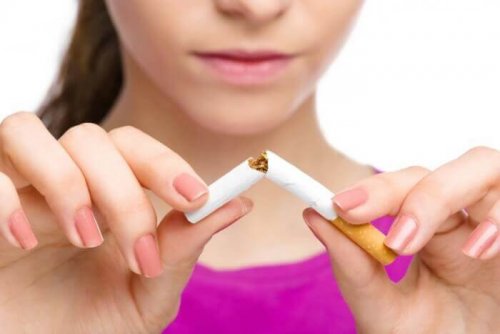Four Ways to Reduce Cholesterol without Statins


Reviewed and approved by the doctor Nelton Abdon Ramos Rojas
Statins are drugs that help control and reduce cholesterol levels. However, statins often have harmful side effects for those who take them. For this reason, we’d like to tell you some ways to reduce your cholesterol without using statins. Say no to drugs!
The function of these lipid-lowering medications is to block the liver’s production of cholesterol. However, the effectiveness of statins in reducing or balancing cholesterol levels brings with it many other negative consequences. Among them are muscle pain, increased the risk of diabetes mellitus, abnormal blood levels of liver enzymes, and digestive problems. Also, they inhibit the enzyme HDL-C, which plays a central role in the production of healthy cholesterol.
Due to these effects, you should know that there are other ways to reduce cholesterol without the use of statins so you can reduce your chances of a cardiovascular problem. Read more below.
Four Ways to Reduce Cholesterol without Statins
Elevated levels of cholesterol in the blood lead to atherosclerosis. Over time, this can lead to a heart attack, stroke, and peripheral vascular disease. These levels are best treated with a strict diet consisting of low saturated fat and trans-fat-free, low cholesterol foods.
In order to prevent this without needing to resort to drugs, here are some lower cholesterol levels without statins:
1. Change Your Diet

The first tip for reducing high cholesterol levels without statins is to change your diet. A healthy diet means:
- Avoiding trans fats. This includes margarine and any other processed vegetable oil that comes from food inside a pretty, printed package.
- Lowering consumption of saturated fats. Butter, eggs, and red meats are a lot healthier than trans-fats, but as with everything, they must be consumed in moderation and within a balanced diet that contains a little bit of every other food group.
- Cutting down consumption of refined grains, sugars, and sodium. Again, pretty much anything processed and packaged.
Conversely, a well-balanced diet should include fresh foods rich in fiber such as fruits, vegetables, seeds, and whole grains. In addition, it should contain foods with omega 3 fatty acid, calcium, magnesium, potassium, and vitamin D. In addition, it’s necessary that you incorporate appropriate portions of all of the food groups on your daily meals.
Certain foods that can help reduce cholesterol levels are nuts, olive oil, beans, eggplants, fish, whole grains, oats, bananas, soy and grapes.
A good diet is important to everyone. After, you are what you eat. However, it’s crucial for people who are susceptible to cardiovascular conditions.
Read also: 6 Tips to Help You Prevent a Stroke
2. Quit Smoking

It’s well known that smoking brings with it multiple consequences for your health. In this case, along with cholesterol, smoking contributes to heart disease. So, if you have elevated levels of cholesterol, it may be the ideal time to stop smoking.
Quitting smoking is clearly associated with an increase in the enzyme HDL-C concentrations. Generally, the increase occurs rapidly, in less than three weeks, with no clear pattern of change thereafter. This emphasizes that some of the adverse effects of smoking appear to be rapidly reversible upon quitting. Consequently, it strengthens the argument for encouraging smokers to quit.
3. Reduce Stress
If you want to lower your cholesterol levels, then you should try to keep lead a stress-free life. There’s definitely a correlation between stress and elevated cholesterol levels.
Decreasing stress may be as simple as taking on fewer responsibilities and increasing your physical activity and time in nature.
In order to better deal with stress, first it’s important to realize when it’s causing you a problem. Then, identify the causes and review and change your lifestyle. The point here is to release the pressure that may arise from trying to do too many things in a short amount of time.
Discover: How to Manage Stress Properly
4. Reduce Cholesterol without Statins with Exercise

In addition to helping you reduce stress, exercise has a very positive impact on the physical fitness of individuals with dyslipidemia, and therefore it reduces cholesterol levels. The optimal mode, frequency, intensity and duration of exercise for improvement of cholesterol levels are, however, yet to be identified.
Nevertheless, studies on the subject confirm the beneficial effects of regular physical activity on cholesterol levels, as it aids in the prevention and management of elevated levels of cholesterol while reducing the risks of heart attacks, strokes, and coronary artery disease.
Overall, you should be as physically active as possible, but just 30 minutes a day will help reduce cholesterol levels.
Finally, keep in mind that if you want to reduce cholesterol without statins, then you must let go of bad habits and improve your overall lifestyle.
All cited sources were thoroughly reviewed by our team to ensure their quality, reliability, currency, and validity. The bibliography of this article was considered reliable and of academic or scientific accuracy.
- Aune D, Giovannucci E, Boffetta P, Fadnes LT, Keum N, Norat T, Greenwood DC, Riboli E, Vatten LJ, Tonstad S. Fruit and vegetable intake and the risk of cardiovascular disease, total cancer and all-cause mortality-a systematic review and dose-response meta-analysis of prospective studies. Int J Epidemiol. 2017 Jun 1;46(3):1029-1056. doi: 10.1093/ije/dyw319. PMID: 28338764; PMCID: PMC5837313.
- Song W, Wang W, Dou LY, Wang Y, Xu Y, Chen LF, Yan XW. The implication of cigarette smoking and cessation on macrophage cholesterol efflux in coronary artery disease patients. J Lipid Res. 2015 Mar;56(3):682-691. doi: 10.1194/jlr.P055491. Epub 2015 Jan 19. PMID: 25601961; PMCID: PMC4340315.
- Kivimäki M, Steptoe A. Effects of stress on the development and progression of cardiovascular disease. Nat Rev Cardiol. 2018 Apr;15(4):215-229. doi: 10.1038/nrcardio.2017.189. Epub 2017 Dec 7. PMID: 29213140.
This text is provided for informational purposes only and does not replace consultation with a professional. If in doubt, consult your specialist.








